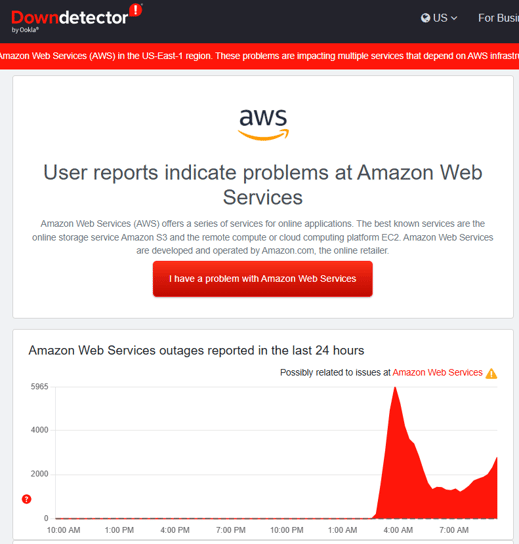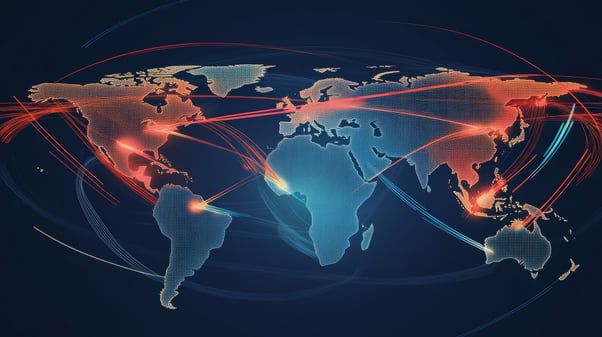As many of us have our head in the clouds for Halloween that is on a Friday this year, something spookier has grabbed folks’ attention this week. On Monday October 20th, people noticed that something was off. Social media apps taking minutes to send messages or to send at all, streaming shows not loading properly, difficulties in sending deposits through Venmo, or even grabbing a drink from Starbucks and their POS systems are down. The cause: AWS had an outage that lasted for over half a day on Monday (great way to start off the week amiright?) For many, frustration and eagerness took over as they could only wait for this to be resolved. But just how many internet services and applications were affected?

What is AWS?
AWS, or Amazon Web Services, is a cloud computing platform that offers a wide variety of services for its users. Some of these services as an on-demand IT resource provider include storage, databases, software, and networking. As someone relatively new to Cybersecurity, I was not aware until this outage cyber event that Amazon had its own IT resources or that so many companies relied on them to store their data to have their applications run smoothly.
If you are not aware, here is a partial list of companies that are collaborated with Amazon with data and platforms:
- Hulu
- Lyft
- Netflix
- Spotify
- Starbucks
- T-Mobile
- Verizon
- Venmo
- Zoom
- Canva
- Snapchat
- And more!
.png?width=458&height=849&name=image%20(2).png)
Including those sites, Amazon’s own apps like Alexa, Prime Video, Kindle, and Ring were also affected by these outages. Within the first two hours of the AWS outage, millions of users were affected worldwide.
When we look at the numbers, 1.4 million users in the US reported issues, in the UK 800,000 users reported outage issues, Australia, France and Japan issues between 350,000-400,000 reports. The saying that when one ecosystem is affected, others follow shortly thereafter.
You may wonder, when did the outages begin to happen? According to Downdetector, which is a website that tracks outages across the internet, it detected abnormalities in its servers around 1-3am ET. Pretty much when a lot of us were asleep and unaware while other places around the world began to see their apps slow down or become overall unresponsive. We expect these outages to be resolved ASAP, but this outage lasted for over 12 hours, which for our Ekaru team, we had an uptick in calls asking for clarity as to what is causing systems that usually don’t have issues to falter. Some calls were even about how they noticed Amazon was down, but they had not realized Google or other work related applications were all intertwined causing issues.
The question of the hour, once systems lifted after 12 hours is, “What caused this?” According to Amazon, these outages were related to their DNS or Domain Name System. The Domain Name System assists in converting addresses to numeric ones where it allows websites to function on internet connected devices. However, when one experiences an outage, many follow suit. Around 3pm ET, Amazon states the issue was resolved for the cause of the outages. Of course, once somethings fixed, there are some additional glitches that fizzled out by 6pm ET when everything was fully back to normal.

Takeaways of half day AWS Outage
Monday’s half day outage is a stark reminder that we are significantly reliant on internet companies, along with trusting cloud systems holding our data for personal everyday transactions. It’s normal to be on edge when applications used so frequently aren’t functioning properly out of nowhere. Especially when AWS covers 30% of cloud infrastructure market.
In situations like this, it’s hard to focus on what you can control rather than what you cannot control. However, in a business, you can control the safety of your business’s security, even on a budget. For small to medium sized businesses, you may use AWS for personal use more than commercial business use, but it’s still just as important to have a cloud drive for backups in cases of an emergency.
Our team can help introduce your business to services that will help tighten your business’ security, email, password management, cybersecurity awareness training and so much more. All while taking your budget into consideration. When the scenario arises of a global cloud system outage like AWS, it’s important in practice to have some type of backup if that information were to be unattainable.
Don’t wait to act on having an independent backup for your sensitive data and business information, learn more about our cybersecurity program, cloud backup, and password management by giving us a call at 978-692-4200 or visit our website at www.Ekaru.com.
Cybersecurity is everyone’s responsibility in a heavy technology based environment.
.png)